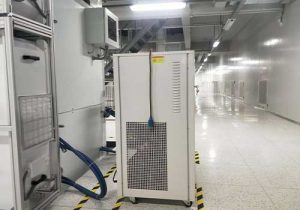industrial chiller machine
Industrial Chiller Machines: A Comprehensive Overview
Industrial chiller machines play a vital role in the efficient operation of numerous industries, providing precise temperature control for processes that demand stable and cool conditions. These machines are designed to remove excess heat generated during manufacturing processes, ensuring the quality of products and the longevity of equipment. This article delves into the intricacies of industrial chiller machines, examining their components, types, applications, and the factors that should be considered when selecting the appropriate chiller for a specific industrial application.

Key Components of Industrial Chiller Machines
Industrial chiller machines comprise several key components that work together to maintain the desired cooling effect:
Compressor: The compressor is the workhorse of the chiller, responsible for increasing the pressure and temperature of the refrigerant, which enables heat transfer.
Condenser: The condenser is where the refrigerant releases heat to the surroundings, typically using air or water as the cooling medium.
Evaporator: In the evaporator, the refrigerant absorbs heat from the process fluid or air, providing the cooling effect.
Expansion Valve: The expansion valve controls the flow of refrigerant from the condenser to the evaporator, ensuring optimal cooling efficiency.
Control System: A sophisticated control system monitors and adjusts the operation of the chiller to maintain the set temperature and ensure energy efficiency.

Types of Industrial Chiller Machines
Air-Cooled Chillers: These chillers use fans to dissipate heat into the atmosphere, making them suitable for environments with limited water resources.
Water-Cooled Chillers: More efficient in warmer climates, water-cooled chillers use a water source to absorb heat from the refrigerant.
Screw Chillers: These chillers use a screw compressor for efficient cooling and are suitable for a wide range of industrial processes.
Applications of Industrial Chiller Machines
Industrial chiller machines are used across various industries for different applications:
Chemical Processing: Chillers are used to control the temperature of chemical reactions, ensuring product quality and safety.
Plastics and Rubber Industry: In injection molding and extrusion processes, chillers help to cool the materials quickly, improving production efficiency.

Food and Beverage: Chillers are essential for maintaining optimal temperatures in food processing, storage, and cold chain logistics.
Pharmaceuticals: Temperature control is critical in the production and storage of medications, and chillers ensure consistent conditions.
Selecting the Right Industrial Chiller Machine
Selecting the appropriate industrial chiller machine involves considering several factors:
Cooling Capacity: The chiller must have sufficient capacity to meet the cooling demands of the process.
Energy Efficiency: Chillers with high energy efficiency can reduce operational costs and environmental impact.
Environment: The choice of chiller may be influenced by the local climate and the availability of water resources.
Maintenance and Reliability: Industrial chillers should be low-maintenance and reliable to minimize downtime.
Conclusion
Industrial chiller machines are essential for maintaining optimal temperatures in a variety of manufacturing processes. Understanding the different types, components, and applications of these machines is crucial for selecting the right chiller for a specific industrial application. By considering factors such as cooling capacity, energy efficiency, and environmental conditions, engineers and operators can ensure the efficient and effective operation of their industrial processes.
Related recommendations
industrial water cooled chillers
498Introduction to Industrial Water - Cooled ChillersIndustrial water - cooled chillers play a vital role in maintaining optimal temperatures for industrial processes. These chillers are designed to...
View detailsindustrial chiller plant
720Understanding Industrial Chiller Plants Industrial chiller plants are critical for cooling and temperature control in a wide array of industries. They ensure that processes and equipment operat...
View detailsapplication of chiller
593Application of Chiller: A Comprehensive Guide Introduction Chillers are essential cooling systems used in a wide range of industries and applications to maintain optimal temperatures for pro...
View detailsAdvantages of Air Cooled Chillers
1245Advantages of Air Cooled Chillers Configuration of air-cooled chillerAccording to the compressor, the air-cooled chiller can be divided into an air-cooled scroll chiller and an air-cooled sc...
View details
 LNEYA Chiller
LNEYA Chiller






HelloPlease log in